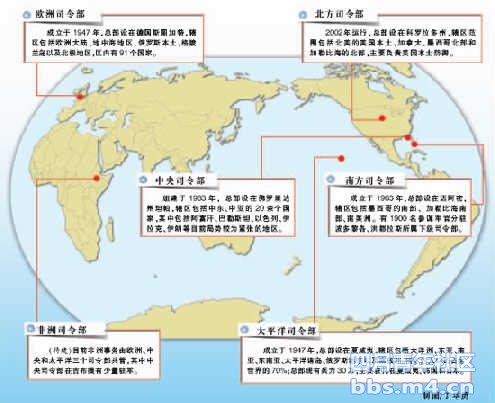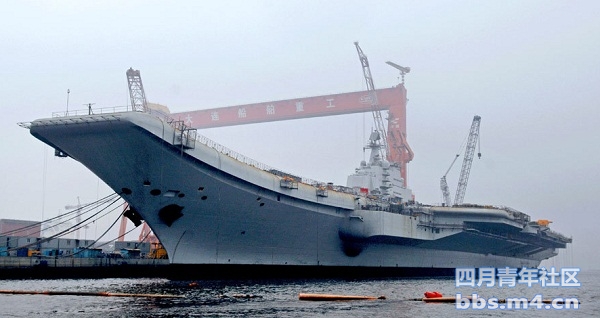|
|
本帖最后由 山水之间 于 2011-9-10 16:07 编辑
专译:911后中国是美国下一个目标?
2011-09-10 00:52:10
http://gb.chinareviewnews.com/doc/1018/3/0/1/101830106.html?coluid=7&kindid=0&docid=101830106&mdate=0910005039

中评社香港9月10日电(记者 黄蔚编译报道)911事件十周年了,美国发动了阿富汗和伊拉克战争,还成功击毙了拉登。可能很多对911事件的评论和回顾会在结尾段落中,展望下一个美国在地缘政治上面对的挑战。很多人会认为,这十年,美国在中东昂贵地推行冒险主义,使得美国忘记把心思放在亚洲——这个聚集世界主要经济体和新兴大国、并塑造21世纪的重要地域。
美国《时代》杂志近日刊登分析文章指出,美国保守势力的兴起要求美国加强在亚太地区的军事部署,并以此制衡正处在上升阶段的中国。但由于中国不同于美国,不会依靠军事实力成为世界主导力量,所以美国最好“明智地”放弃寻找新敌人并给予打击的落后观点。
文章引述部分人观点称,亚洲中最让人害怕的不是异于美国的意识形态,不是可能出现的恐怖袭击,说白了,是中国。
中国作为经济大国和军事强国的崛起,已经使美国担忧。其海军的现代化似乎直接挑战了美军的优势地位。美国众多专家们已经就未来的严峻形势和民主秩序发出警告,因为美国在不断上升的中国面前,感受到了巨大的压力。
美国企业研究所中亚问题学者迈克尔.奥斯林上周发表分析文章,为美国在太平洋地区提供了一个战略建议。相比起“反中国”,奥斯林声称他的建议为“亲亚”,虽然这两者几乎没太大分别。
文章称,奥斯林的文章标题为“建设、保持和清除:美国的亚洲战略”,它重新把美国对伊拉克和阿富汗的“明确,持有和建设”应用在当前的亚太地区。由于美国在这两个国家发起的战争带来了诸多问题,奥斯林的建议立马就招来了诸多争议。
但是,他并不认为美国实力会下降,还呼吁决策者把重点放在“下一个美国时代”。这包括,重新确立美国在亚洲的利益,增多亚洲盟友和更直接地面对中国。
奥斯林写道:美国必须有一个明确的外交路线;美国需要直面中国在南海问题上对美造成的压力。
奥斯林还认为,美国必须插手中国对领土、领海的要求,还要“推进”中国的民主进程。虽然目前美国财力有限,但他仍然建议美军在澳大利亚建立军事基地,并把东南亚划分到美国航母的管辖范围,并以此加强美国在亚太地区的影响力。
“把更多的潜艇、弹道导弹和隐形飞机布置在亚洲,可以重新平衡全球力量,并增进美国与其盟友之间的关系,”奥斯林在文章中这么写道。
文章表示,这其中有一些明显的问题。目前,中国几乎是任何一个亚洲国家的重要贸易伙伴,所以没有一个政府愿意把自己划入反中国的联盟。2007日本联系澳大利亚和印度发出“自由弧线”的呼吁,如今已没有人愿意重复。
尽管中国的军事崛起引起了邻国的警惕,这很大程度上来自中国首艘航母的试航,但中国军力却还远不能与美国军力同日而语。
文章表示,其实,与中国直接对抗很可能会适得其反,美国过度对抗只会让中国变得更加强硬,更加刺激中国的民族主义。在亚洲继续冷战思维将是一个巨大的错误,这不仅因为世界正在迈向多极化,还因为中国并不像美国那样,依靠航母和军事基地赢来主导地位。
查尔斯.肯尼在《外交政策》杂志上写道,“中国将是一个很不一样的世界大国,因为权力的性质已经发生了巨大的变化。”中国日益融入国际社会,肯尼说,意味着中国“将很大程度上推行多边主义以维护自己的利益”并和邻国建立良好的关系。
911十年来,华盛顿用“恐怖”做借口,发动昂贵的战争,现在,美国是时候好好反思,并明智地停止寻找下一个敌人了。
原文:
Ten Years After 9/11, Is It Now Time to be Afraid of China?
Posted by Ishaan Tharoor Thursday, September 8, 2011 at 5:52 pm
http://globalspin.blogs.time.com/2011/09/08/ten-years-after-911-is-it-now-the-time-to-be-afraid-of-china/

A vessel reported to be the Ukrainian-made aircraft carrier Varyag, which China bought in the 1990s, is seen at a port in Dalian, Liaoning province, April 17, 2011. (Photo: Reuters)
As the commentaries, retrospectives and meditations pile up ten years after 9/11, expect quite a few in their closing paragraphs to look toward the next grand geo-political challenge facing the U.S. A decade of costly adventurism in the Middle East and Afghanistan, many will argue, distracted U.S. policy making from the new realities of Asia, where some of the world's main economies and rising powers are shaping the future decades of the 21st century.
The bogeyman here is not an ideology or some shadowy terrorist threat, but, to be blunt, China. Beijing's rise as an economic and military power raises understandable concerns. The modernization of its navy and army seem calculated to directly challenge the preeminence of American power. As an authoritarian state, China has shown a penchant for a cold-blooded foreign policy, happy to support troublesome regimes from Khartoum to Pyongyang. A raft of pundits have already issued grim warnings about the future of the global liberal, democratic order — one which emerged during the 20th century's Pax Americana — as it gets pressured by the new imperatives of a Chinese hegemon.
Tapping into this sense of alarm, an essay published last week in the National Review by Michael Auslin, the resident East Asia scholar at the right-of-center American Enterprise Institute, offers up a vision for American strategy in the Pacific. Though Auslin claims his proposal is more “pro-Asia” than it is “anti-China,” it's hard to see how the two in his formulation are all that different.
Auslin's essay — entitled “Build, Hold and Clear: An American Strategy for Asia” — is a re-invention of the U.S.'s “counter-insurgency” doctrine invoked in Iraq and Afghanistan of “clear, hold and build,” now applied across the wide tableau of the Asia-Pacific. Given the profound doubts hanging over U.S. operations in those two war-blighted countries, questions ought to immediately arise. Auslin shrugs off any concerns of U.S. decline or failure, and calls for policymakers to focus on "the next American era today." This involves, ostensibly, reasserting U.S. interests across Asia by "building a larger community" of like-minded allies and confronting China more directly. Auslin writes:
【We must have a clear diplomatic line that does not confuse our friends and realistically calls out those nations that act in destabilizing ways. The Obama administration has begun to openly put such pressure on China over maritime territorial claims, but our reluctance to make clear China's negative policies with respect to North Korea, Burma, Iran, and other nations, as well as its continuing abysmal human-rights record, means we are sending mixed messages to those nations that seek to adhere to higher standards of international and domestic behavior.】
From checking Chinese expansionism in the South China Sea to shoring up the development of democracy in the region, Auslim imagines American leadership ought to play a key role. No matter the U.S.'s budgetary woes, he suggests a reinforcement of the U.S.'s military position in the region, seeking basing rights in Australia and greater access for naval units and American aircraft in Southeast Asia. "Rebalancing our global forces so as to put more submarines, ballistic-missile defense measures, and stealth aircraft in Asia," writes Auslin, "will reassure allies and complicate any aggressive plans of potential adversaries." No points for guessing who these adversaries are.
There are some obvious problems here. With China a vital trade partner for virtually every nation in Asia, no government is willing to let itself be drawn into any sort of anti-Chinese bloc. A 2007 call by an earlier Japanese administration for "an arc of freedom" linking democracies like Australia, Japan and India proved to be words in the wind few are willing to repeat. Moreover, some Asian governments are wary of acting in lockstep with a country that for years bossed the world as its lone superpower. India has seen a dramatic improvement of ties with the U.S. over the past decade, yet policy independence is a pronounced mantra of any Indian government; cozying up to Washington remains a political faux-pas.
While China's military rise has neighbors wary, a time when the Chinese PLA could legitimately rival the U.S. military is still far off. Much was made of the launch earlier this summer of China's first aircraft carrier. But, as academics Shashank Joshi and Ashley Townshend write, the repurposed ex-Soviet hulk will give U.S. naval officials few sleepless nights. Indeed, striking a confrontational pose against the Chinese is likely counter-productive:
【Overreactions will only strengthen Communist Party and PLA hardliners, emboldening strands of Chinese nationalism. While co-operating to blunt the PLA navy's offensive capabilities, the US and its allies should recognise Beijing's legitimate maritime interests.】
A Cold War mentality in Asia is an anachronism not simply because the world is now a far more fragmented and "multi-polar" place, but also because China's dominance may not rely — like the U.S.'s did — on aircraft carriers and forward operating bases. As Charles Kenny writes in Foreign Policy, "China will be a different kind of global power because the nature of global power has changed dramatically." China's growing stake in an ever-integrating global economy, says Kenny, means it will have "considerable self-interest in maintaining multilateralism" and playing nice with its neighbors. After a decade that has seen policy-makers in Washington set up the shibboleth of "terror" as a pretext for two costly wars, it might be wise to stop seeking the next great enemy around the corner. |
|